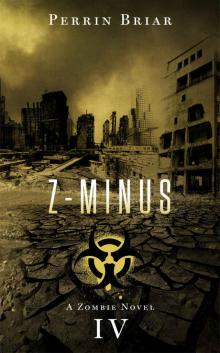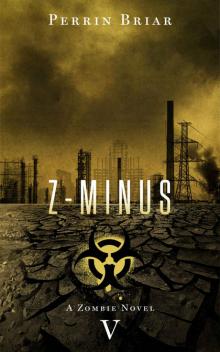- Home
- Perrin Briar
Sink: Old Man's Tale Page 5
Sink: Old Man's Tale Read online
Page 5
“Whoever built this digger did a good job,” Jeremiah said.
“Our engineers restored it,” Leader said. “We’ve tried oil, tried heating it and running it through the system again, but each time we try, it just blows up. Now we need to come up with a different system. Something we can use to convert energy.”
Jeremiah smiled.
“It appears my being here may not have been entirely by chance,” he said. “I am, or was, an engineer. I’m sure I can come up with a power system that will make it run.”
“You could?” Leader said.
“Oh yes,” Jeremiah said. “It shouldn’t be that difficult. All we’d need is a converter to turn energy into electrical energy. We probably have most of the materials here already. Though some of your people might have to provide the power we need.”
“We are at your disposal,” Leader said, bowing low. “Anything you need shall be yours. Just name it. I’ll get some workers to move the digger into the castle.”
He left to make arrangements. Graham sidled up to Jeremiah.
“Are you sure you can do this?” he said.
“I was an engineer in the Air Force for thirty years,” Jeremiah said. “I should be able to knock something together.”
Graham wanted to cry with relief.
“You mean, we’re going home?” he said.
“Yes,” Jeremiah said. “With a little elbow grease, we’re going home.”
Chapter Sixteen
The digger had been set up in the middle of the room, with tools of every shape and size arranged around it. There was nothing quite like a new wrench set, unblemished and untouched by any hand but the one that had made it. Jeremiah picked up a 3/8” wrench and felt the weight in his hand, like a samurai holding a great sword. He’d forgotten just how good it felt. He could make out little chips in the wrench’s surface from where it had been hand-crafted.
“Everything you requested is here,” Leader said.
Jeremiah cast an eye over the materials.
“Woah, hold on Chief,” Jeremiah said. “Magnets. Where are the magnets?”
“We’re searching through the items in the museum now,” Leader said. “Please continue to build until we have them.”
He left.
“They’re very hospitable, aren’t they?” Graham said.
“Can you blame them?” Jeremiah said. “With a machine to dig for them, it’ll make their work a lot easier. No more backbreaking labor.”
“But it’s only one machine,” Graham said. “They’re digging lots of tunnels out there.”
“We would only need one machine,” Jeremiah said. “It could do the work of a thousand men.”
“How long do you think it’ll take to build?” Graham said.
“Most of the machine is ready,” Jeremiah said. “We just need to build the power converter. A day. Maybe two.”
“That long?” Graham said.
“There’s no one who can build it faster,” Jeremiah said. “Believe me.”
“If you weren’t so decrepit and old, I might have believed you,” Graham said.
“You could show your only hope of getting out of here within your lifetime a little respect,” Jeremiah said.
Graham bowed down.
“Yes, Master,” he said, before sitting down in one of the tall-backed dining chairs.
“Jack up the backend, will you,” Jeremiah said, shrugging off his coat.
“Who?” Graham said. “Me?”
“No, the Easter Bunny,” Jeremiah said. “Of course you.”
“Jack up?” Graham said.
“It means lift up with the use of a device called a jack,” Jeremiah said.
“I know what it means,” Graham said. “But why am I the one who has to do it?”
“Can you see anyone else here?” Jeremiah said.
“I’m not your lackey,” Graham said.
“You’re my assistant,” Jeremiah said. “Jack up the backend.”
“What are you going to do?” Graham said.
“I’m going to take a look at the engine and see what we’ve got here,” Jeremiah said. “That is unless you want to take a look at it?”
Graham glanced at the engine. He clearly didn’t know the front from the back.
“I didn’t think so,” Jeremiah said.
Graham dragged the jack over to the underside of the digger and began to pump.
“How long do you think it’ll take the digger to reach the surface?” he said.
“Not long I should think,” Jeremiah said. “If it’s running at full power it could go through up to one thirty meters of soil an hour. Maybe more. So it won’t take more than a few hours.”
“Why do you think that?” Graham said, already sweating from the effort.
“Because we didn’t fall that far,” Jeremiah said.
“Felt a long way to me,” Graham said, leaning on the jack and wiping his brow. “And Leader said they’ve been digging for three hundred years.”
“It doesn’t matter how long you dig if you’re digging in the wrong direction,” Jeremiah said. “We’re no more than a few hundred meters below the surface at the most.”
“How can you possibly know that?” Graham said.
“When we fell earlier, we couldn’t have fallen for more than fifty seconds, a minute tops,” Jeremiah said.
“Yeah, so?” Graham said.
“So, don’t you remember your high school physics?” Jeremiah said.
“No,” Graham said. “I’m surprised you do.”
“Look, if we fell for one second the force of gravity pulls at almost ten meters per second per second,” Jeremiah said. “We didn’t fall straight down. We slid most of it, so if we round down we’d end up with…”
He muttered under his breath, eyes moving left to right as he worked out the calculations in his head.
“Three hundred meters,” Jeremiah said. “Maximum.”
“Still a long way though, isn’t it?” Graham said.
“It’s not a short distance, but it could be worse,” Jeremiah said. “A lot worse. Who knows where we could have ended up. I say we’re pretty lucky.”
“But if we’re so close to the surface, why haven’t they found a way up there yet?” Graham said.
“That’s the very question I’ve been asking myself,” Jeremiah said. “Come on, let’s get to work.”
Chapter Seventeen
They worked all day without taking a break, entering the zone where nothing came between them but the task in hand. Leader’s servants came periodically to bring food and drink. The two men didn’t chat to them or take their eyes from the machinery they were working on. Their only concern was putting the machine together so they could return home.
The digger’s engine was in pieces on the floor, organized in a way Graham didn’t understand, but made perfect sense to Jeremiah. The old man ignored Graham every time he tried to initiate conversation, grumbling under his breath and concentrating on the parts on the floor.
Graham had smudges of oil and dirt on his face, hands and clothes.
“Why am I always the one getting dumped on?” Graham said.
“Because you’re unskilled,” Jeremiah said. “Expendable.”
“Gee, thanks,” Graham said. “It’s always nice to feel an intrinsic part of the project.”
The main doors opened and Leader came in, walking in his slow gait. A guard was in his wake.
“These are all the magnets we found,” Leader said.
The guard held a small pile in his hands.
“This is it?” Jeremiah said.
“It’s all we could find,” Leader said.
“This isn’t enough,” Jeremiah said. “We need a lot more than this.”
“We don’t have more,” Leader said. “I have people combing the town, but this is all we’ve found so far.”
Jeremiah’s shoulders sagged and he fell into a dining room chair.
“Then we’re stuck here,” he said. “We
can’t get out of here without magnets.”
Graham kicked at the machine’s large wheels, venting his anger. A large bolt fell off and hit him on the head. He rubbed his head and scowled. He gritted his teeth and unleashed another wave of anger at the machine.
Chapter Eighteen
Graham laid his forehead on the table and let out a groan. His brain hurt from all the pressure he was putting on it.
“What if we put a current through the magnets we do have?” Graham said. “That’ll make them stronger, right?”
“Yes,” Jeremiah said. “But that’s what we need the magnets for in the first place – to make power.”
Graham let out a groan.
“I can’t believe we’re stuck down here because of fridge magnets,” he said. “I’ve got a ton at home.”
He stood up.
“No!” he said. “I refuse to be beaten by this.”
He paced up and down the room. He stopped, looked at the machine, and then turned to face Jeremiah.
“What if…” he said, before trailing off and shaking his head. “I’ve got nothing.”
“If I don’t get back soon they’re going to demolish my house,” Jeremiah said.
“You don’t know that,” Graham said.
“But I do know it,” Jeremiah said. “They’ll find I’m not there, see the hole and assume the worst. They won’t spend much time looking for me. They’ll fill the hole in and demolish the house. And that’ll be it. If you don’t get back, what happens? Nothing.”
“I don’t want to spend the rest of my life down here,” Graham said.
“You think I do?” Jeremiah said.
“At least you don’t have much time left to wait,” Graham said.
They were silent a moment.
“My boss said he heard rumors about you back in town,” Graham said.
“Oh?” Jeremiah said.
“A rumor about what happened to your wife,” Graham said. “One day she just up and vanished.”
Jeremiah didn’t respond.
“So there’s no truth to it?” Graham said.
“There’s always some truth,” Jeremiah said. “Even to rumors.”
“Then what did happen to your wife?” Graham said.
“I murdered her,” Jeremiah said. “And then I diced her up and buried her in the Outback. Depending on which version you hear.”
Graham couldn’t tell if Jeremiah was joking or not.
“The cops would have arrested you if it were true,” Graham said.
“Not if there wasn’t enough evidence,” Jeremiah said.
“They would have searched your house top to bottom,” Graham said. “They would have found something.”
“They didn’t,” Jeremiah said.
Graham gulped.
“They searched your home?” he said.
“Top to bottom, as you said,” Jeremiah said. “Even the police have to act on rumors.”
“I used to come to your house, you know,” Graham said.
“I know,” Jeremiah said. “Snooping around. I still don’t know what you were looking for.”
“I meant when I was a kid,” Graham said. “Don’t you recognize me?”
Jeremiah looked at Graham close, but there was no recognition there.
“No,” he said.
“I was Stuart’s friend,” Graham said. “There are pictures of me in your photo albums. I used to come over at the weekends and play. You would cook big breakfasts for us.”
Jeremiah’s eyes moved to the side. He remembered something.
“Stuart had a lot of friends,” he said.
“You really don’t remember me?” Graham said.
“I said I didn’t, didn’t I?” Jeremiah said.
“I remember you,” Graham said. “You weren’t always this grumpy. You were fun and carefree, once upon a time.”
“That was a long time ago,” Jeremiah said.
“What happened to you?” Graham said.
“Life happened,” Jeremiah said.
“Your wife was alive then,” Graham said. “You were different.”
“We all were,” Jeremiah said.
“But you especially,” Graham said. “Maybe if you were more social people wouldn’t make up stories about you so much.”
“You think I care what they think?” Jeremiah said. “I don’t care. People will say and do what they want. I’m not a part of their lives any more than they’re a part of mine. I just want to get back home.”
“I keep in touch with him, you know,” Graham said.
“With who?” Jeremiah said.
“With Stuart,” Graham said.
Jeremiah blinked, casting an eye over Graham.
“Only by social media,” Graham said. “We’re not close. But I see his newsfeed from time to time. He’s doing all right.”
“That’s nice,” Jeremiah said.
“He changed companies,” Graham said. “He has a kid. A little boy.”
“That’s nice,” Jeremiah said.
He repeated the words with the same studied tone of voice.
“You didn’t know that before I told you, did you?” Graham said. “That your son has a son.”
Jeremiah said nothing.
“Why don’t you talk anymore?” Graham said.
“That’s none of your business,” Jeremiah said.
“There’s no reason to be so uptight, Jerry,” Graham said.
“Don’t call me Jerry,” Jeremiah said.
“Jerry, Jerry, Jerry,” Graham said.
Jeremiah turned with deliberate slowness toward Graham, his eyebrow cocked.
“Now I know what pushes your buttons I’ll just keep pushing them, unless you talk to me,” Graham said.
“You’re really annoying,” Jeremiah said.
“You only just noticed that?” Graham said.
“No wonder you don’t have any friends,” Jeremiah said.
“Look who’s talking,” Graham said.
“As we’re becoming new best buddies, be honest with me,” Jeremiah said.
“I’ve been nothing but honest with you since we came down here,” Graham said.
“Then maybe you’d be kind enough to tell me what you were doing in my house the night we sank,” Jeremiah said. “You weren’t housekeeping, I know that much.”
Graham turned his head to one side.
“I was… investigating a few things,” he said.
“What things?” Jeremiah said.
“I know what my company was trying to do to you and your land,” Graham said. “I couldn’t just sit by and watch them take everything from you.”
“Oh, so you were on my side, ay?” Jeremiah said. “That’s a turn up for the books.”
“Sometimes in my line of work it helps to have one face for some people, another for others,” Graham said.
“How am I supposed to know this face you’re showing me now is the real one?” Jeremiah said.
“What reason do I have to lie to you?” Graham said.
“Oh, I’d say you have plenty of reasons,” Jeremiah said. “About half a million, in fact.”
“Your property’s not worth anywhere near that,” Graham said.
“Financially, maybe not,” Jeremiah said. “But it means a lot more to me than just money.”
“Don’t you want to retire in a nice old folks’ home?” Graham said. “I know if I were you, that’s where I’d want to be. You can socialize, meet new people, make new friends. Maybe even get yourself a girlfriend.”
“Do I look like I want a girlfriend?” Jeremiah said.
Graham sighed. He looked out the window, down on the town below.
“Looks like they’re preparing something out there,” he said.
“Probably the cooking pot for when we fail to come up with something,” Jeremiah said.
“Listen to Mister Upbeat over here,” Graham said. “You don’t always have to think everything is against you, you know.”
“Why no
t?” Jeremiah said. “It’s how it usually goes.”
Jeremiah pressed his nose to the glass. Big drums with oil in them had been lit, all over the town. People were emerging out onto the street and heading toward the castle.
“It’s no good us being cooped up in here,” Graham said. “We should go for a walk, take some time out. Maybe the solution will come to us.”
“That’s not a bad idea,” Jeremiah said. “At least it’ll make us tender for the cook pot. I’d hate to be gamey.”
Chapter Nineteen
The local little men and women glanced at these two Surfacers but were quick to look away. The guards eyed the locals with stern glares, and followed Graham and Jeremiah every step they took.
“Tell me,” Jeremiah said to Graham. “Do you feel like a VIP or a VDP?”
“What’s the D for?” Graham said.
“Dangerous,” Jeremiah said.
“They’re just doing their job,” Graham said.
But he had to admit, it was strange. It was like they were celebrities. Unfortunately it was for committing a mass murder rather than something progressive. As they headed into town the guards formed a tight circle around them and buffeted aside anyone who didn’t get out of the way fast enough.
“This is certainly going to make us popular with the locals,” Jeremiah said.
The town folk were gathered in the center of town, around a large platform. Leader took to the stage.
“As I’m sure you’ve all heard, we have been sent two Surfacers and they are working on completing a digger for us,” Leader said. “Soon we will emerge from this earthy darkness and take our place once more on the surface alongside our brothers and sisters.”
“No pressure,” Graham mumbled.
“We must prepare to be welcomed by them with open arms,” Leader said. “They have long been awaiting our return, just as we have been awaiting theirs. Today, we celebrate an end to darkness and fear and welcome the light.”
The big drums kicked off the party. Some of the entertainers were dressed in costumes, others on stilts with masks and long robes. Even with this height advantage they were no taller than Graham and Jeremiah.

 Sink: Once Upon A Time
Sink: Once Upon A Time Flowers Vs. Zombies (Book 5) Buried
Flowers Vs. Zombies (Book 5) Buried Flowers Vs. Zombies (Book 6) Native
Flowers Vs. Zombies (Book 6) Native Z-Minus Box Set 2
Z-Minus Box Set 2 Skip: An Epic Science Fiction Fantasy Adventure Series (Book 2)
Skip: An Epic Science Fiction Fantasy Adventure Series (Book 2) Resistance (Book 1): Juvenile
Resistance (Book 1): Juvenile Blood Memory: A Post-Apocalypse Series (Book Five)
Blood Memory: A Post-Apocalypse Series (Book Five) Sink: The Lost World
Sink: The Lost World![Z-Minus Box Set [Books 1-3] Read online](http://i1.bookreadfree.com/i1/03/30/z-minus_box_set_books_1-3_preview.jpg) Z-Minus Box Set [Books 1-3]
Z-Minus Box Set [Books 1-3] Compulsion
Compulsion The Swiss Family RobinZOM (Book 3)
The Swiss Family RobinZOM (Book 3) Sink: The Complete Series
Sink: The Complete Series Expulsion
Expulsion Z-Minus (Book 4)
Z-Minus (Book 4) Resistant Box Set
Resistant Box Set The Swiss Family RobinZOM (Book 2)
The Swiss Family RobinZOM (Book 2) The Swiss Family RobinZOM (Book 5)
The Swiss Family RobinZOM (Book 5) Z-Minus (Book 5)
Z-Minus (Book 5) Resistance (Book 2): Resistant
Resistance (Book 2): Resistant Blood Memory: The Complete Season One (Books 1-5)
Blood Memory: The Complete Season One (Books 1-5) Blood Memory (Season 1): Books 1-5
Blood Memory (Season 1): Books 1-5 Flowers Vs. Zombies: The Complete Series
Flowers Vs. Zombies: The Complete Series Sink: Old Man's Tale
Sink: Old Man's Tale![Cut Off [Part 1] Read online](http://i1.bookreadfree.com/i2/04/06/cut_off_part_1_preview.jpg) Cut Off [Part 1]
Cut Off [Part 1] Flowers vs. Zombies (Book 2): Vagrant
Flowers vs. Zombies (Book 2): Vagrant The Swiss Family RobinZOM (Book 4)
The Swiss Family RobinZOM (Book 4) Repulsion (Compulsion Book 2)
Repulsion (Compulsion Book 2) Skip: An Epic Science Fiction Fantasy Adventure Series (Book 3)
Skip: An Epic Science Fiction Fantasy Adventure Series (Book 3) The Swiss Family RobinZOM
The Swiss Family RobinZOM Z-Minus (Book 6)
Z-Minus (Book 6) Flowers vs. Zombies (Book 4): Exigency
Flowers vs. Zombies (Book 4): Exigency![[An Epic Fantasy 01.0] Skip Read online](http://i1.bookreadfree.com/i2/04/12/an_epic_fantasy_01_0_skip_preview.jpg) [An Epic Fantasy 01.0] Skip
[An Epic Fantasy 01.0] Skip Flowers Vs. Zombies: Genesis
Flowers Vs. Zombies: Genesis